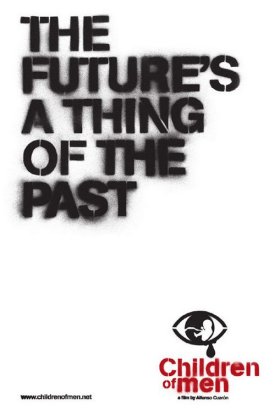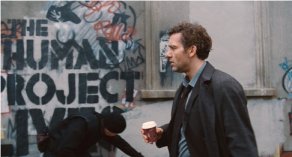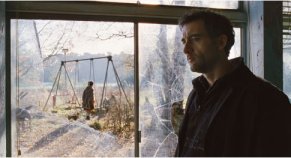|
Children
of Men
Alfonso Cuarón’s Children of Men is
bleak, but damned good. Aptly titled, the director eschews
opening credit sequences and instead dives right into the
film – a practice that some may call a current trend,
but for Children of Men there is purpose behind
the stylistic decision.
Working
from P.D. James’ novel, Cuarón digs deep into
a future where the dying breath of society as a collective
is so ubiquitous that it seeps into each and every corner
of existence. The youngest child in Britain is worshipped
like a celebrity, and an entire nation mourns when the youngest
male is killed. His death is not merely the fall of an icon.
It is the death of societal hope – a visage of humanity’s
last grasp at prolonging the bloodlines squashed on every
television station in an infinite loop.
This
isn’t just an extinction level “what if?”
scenario we are dealing with here. This is the doom of a
species being reaped by its descendents – a pedagogical
riff on the age-old adage “children are supposed to
outlive their parents, not the other way around.”
It is easy to picture a pair of patriarchs blaming themselves
in the sort of scenarios when this phrase is commonly muttered,
and Children of Men is hoping that this is the
image you conjure throughout the film.
Parents
of lost children blame themselves, often wrongfully, but
this film is pointing blame, not consolation and quieted
reassurance. The scenario has been blown up to a global
scale, and the children who have been lost are the generations
to come – those who would inherit the world and shape
the future for a greater good. The blame can be traced to
origins of our own doing, political conflicts and wrong-turns
which have somehow born a pandemic so crippling that children
can no longer be produced – women, as it were, have
become infertile.
Or have
men? The film never pauses to deal in gender-blame semantics,
instead suggesting mutually shared blame peppered with feelings
of inadequacy and loss. Society is clawing to survive, while
insurgents struggle to overthrow a regime bent on keeping
refugees out, and life as they knew it intact. This is the
crux of the film, a power is in play to keep things at status
quo, but how do you fend off evolution?
Theodore
Faron (Clive Owen) is a shadow of his former self –
an ex-revolutionary protestor turned-corporate-shill with
a dark and painful patriarchal history. His pain is a microcosmic
representation of the collective loss of humankind.
We learn,
in time, that he was once married, and that his son was
lost to the pandemic. Along with the death of his son died
the fire that drove him to protest, and he parted ways with
his wife Julian (Julianne Moore) who continued to fight
for what she, and Theo, had once believed in.
Theo’s
past catches up with him when Julian makes contact with
him, requesting his help with a refugee she is aiding. He
agrees to help, and gets caught up in a struggle larger
than his own sense of loss, regret, or financial woes. The
refugee, named Kee (Claire-Hope Ashitey), is an expectant
mother, and she is in a very compromising position. Members
of Julian’s group “The Fishes” see Kee’s
pregnancy as a potential political edge, while the government
would immediately remove the ‘fugee Kee from the scenario
and use her child has a tool of hope for society.
The
allegory here is the struggle to find right, and truth,
in a society so full of politic, pervasiveness, and control.
Allegories to immigration policy, homeland security, and
revolution abound, and Cuarón manages to keep an
even-keel on things despite his own personal leanings.
Keen
and astute viewers will find references (and in some cases
art cameos) to such political voices as Banksy within the
film, but Cuarón’s personal politics are merely
a backdrop. The cautionary voice in this cautionary tale
is the dangers of culpability and corruption where just
intent is concerned, and it works brilliantly.
Like
any good science fiction, technology takes a backseat in
Children of Men to the societal implications at
play. The film includes some brutally rendered action sequences,
so abrupt, jarring, and raw that it almost does injustice
to mention them in this review.
A couple
of key notes must be mentioned, specifically Cuarón’s
use of the long take to add tension and the subtle lack
of “heroic violence.” That’s right, our
protagonist, despite how dire things get, never once brandishes
a gun.
Some
may feel cheated by the films bleak and metaphoric ending,
however it is suiting. Theo’s world is at end, and
his penance is watching everything he cares for being brought
to the cusp of destruction. The true hope in this film is
Theo’s perseverance, and I left the theater hoping
to find our Theo sometime soon.
Rating:

|








